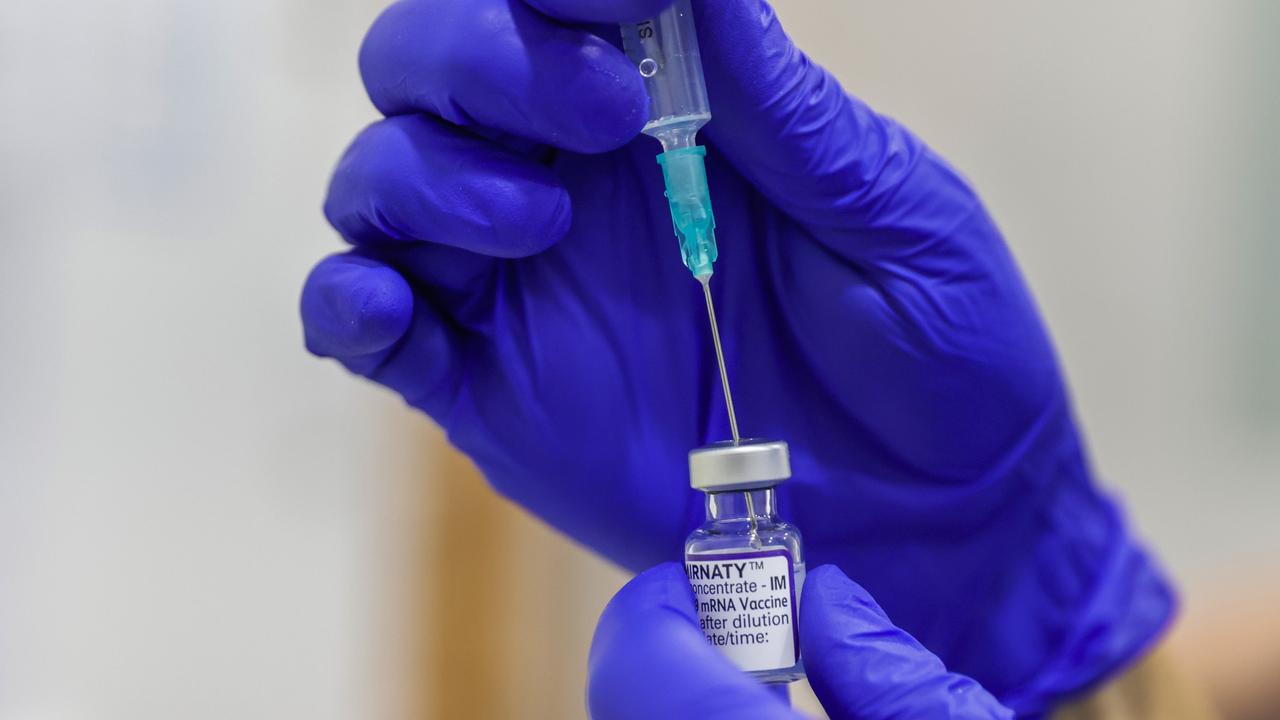China provides millions of Covid vaccine doses that don’t work as well
Beijing is loading up the developing world with dodgy vaccines in an attempt to win friends – and the scary thing is, it just might be working.
NSW Coronavirus News
Don't miss out on the headlines from NSW Coronavirus News. Followed categories will be added to My News.
China’s aggressive “vaccine diplomacy” is leaving a trail of tragedy through the developing world, as the belligerent superpower rushes to hand out its own home-brewed coronavirus vaccines that are less effective than Western jabs.
The move is leaving vulnerable populations dangerously exposed to the virus.
Research from Duke Global Health Innovation Centre in the US shows the vast sweep of China’s vaccine donations, with millions of free jabs flooding South-East Asia, the Middle East, Africa, South America and even some parts of Europe.
China has exported 165 million doses of Sinopharm and 122 million jabs of Sinovax, eclipsing the 66 million doses of Oxford AstraZeneca that have been shipped to date, the Duke research shows. The problem is, these Chinese-made vaccines do not work very well.
What’s more, while they may still keep many patients out of hospital, they appear to be far less effective against transmission — a major problem as the Delta variant, which can spread more easily even if it is less deadly than earlier variants, becomes the dominant form of Covid-19.
According to one recent analysis out of the US, “weekly Covid-19 cases, adjusted for population, have remained elevated in at least six of the world’s most inoculated countries — and five of those nations rely on vaccines from China.”

Meanwhile in Indonesia, the main doctors and nurses’ association said at least 30 healthcare workers died despite receiving two doses of the Sinovac vaccine.
The country is now planning to switch to different Covid-19 vaccines for second doses.
Yet for China, that is almost besides the point.
“It’s important to Beijing to have Chinese vaccines delivered with great fanfare faster than others to build China’s domestic and international narrative that Xi Jinping is triumphing over Covid while others aren’t,” says Michael Shoebridge, director of defence, strategy and national security at the Australian Strategic Policy Institute.
But that could backfire on Xi, Mr Shoebridge said, adding: “The growing knowledge that Sinovac and other Chinese-sourced vaccines just aren’t as effective in preventing serious illness and death from Covid is undercutting Xi’s triumph.”
Study after study has shown that China’s vaccines simply are not as effective as jabs such as those from AstraZeneca, Pfizer and Moderna.

LOWER EFFICACY
In April, Gao Fu, the director of China’s own Centres for Disease Control and Prevention let the cat out of the bag, saying: “The efficacy of (the) existing vaccines is not high … the levels of antibodies generated by our vaccines are lower than mRNA vaccines and the efficacy data are also lower.”
Just how much lower is still a matter of debate.
But studies have shown varying levels of efficacy for the main Chinese vaccines, Sinovac and Sinopharm.

In Brazil, the efficacy for preventing symptomatic infection was just 51 per cent; in Turkey it was 84 per cent.
“If you looked at this back in April then you would say China’s vaccine diplomacy program was going pretty well,” says Richard McGregor, a senior fellow at the Lowy Institute, who spent nearly a decade in China. He added that when you don’t have a choice, “any vaccine is better than no vaccine”.
BEIJING’S BIG BUSINESS
Mr McGregor also points out that despite setbacks and scandals with the Chinese jabs, the fact that Beijing is a far bigger economic and diplomatic player in the region will likely dwarf controversies over their vaccines.
“The Chinese vaccination story has changed,” he says.
“In countries like Thailand and Indonesia, the vaccination programs are now about keeping people out of hospital rather than stopping the spread of the virus.”

But Professor Clive Hamilton notes that China’s vaccine diplomacy “can quickly become vaccine coercion”.
“Paraguay found (this out) earlier this year when Beijing said it would supply vaccines for Paraguay to protect its citizens only if it severed diplomatic relations with Taiwan,’’ he said, adding that the message seemed to be “recognise China or we’ll let your people die’’.
Professor James Laurenceson from the Australian China Relations Institute said despite the lower efficacy of the Chinese jabs, Beijing may have already had a vaccine diplomacy win by getting them out to the world quickly.
“It won’t be lost on say, Indonesia, that the US put all of its priority on getting its own population vaccinated, whereas at the same time China was rolling out the vaccine domestically, it was also already exporting to other countries as well,” he said.

“Washington might put the view that (the lower efficacy of the Chinese vaccines) is going to hurt China’s reputation, and plainly China would love it if their vaccines were the most effective, but that’s not the real choice these countries that are taking the Chinese vaccines face.
“Their real choice is China’s vaccines or nothing, at least up until now.”
Last night, Foreign Minister Marise Payne reaffirmed Australia’s commitment to the rollout of AstraZeneca for many millions of people across the Indo-Pacific as well as technical advice, training of health workers and assistance with public health campaigns.
“We will share at least 20 million Covid-19 vaccine doses with the Pacific and Southeast Asia by mid-2022, including 15 million with the Pacific, 2.5 million with Indonesia and … 1.5 million with Vietnam,’’ Ms Payne said.
“As of this week, we will have delivered close to 750,000 doses to our neighbours in the Pacific and Timor-Leste in support of our partners’ national vaccine plans – including 390,000 to Fiji, 225,000 to Timor-Leste, and deliveries to Papua New Guinea, Solomon Islands, Samoa and Tuvalu in accordance with the domestic vaccination plans and priorities of each nation.”
“Importantly, our support is end-to-end, meaning that we do not simply deliver vaccines but provide technical advice, training of health workers, cold chain storage and assistance with public health campaigns.
“We have developed country-specific vaccine partnership plans, which tailors our support to each partner country’s contexts and needs.
“This comes on top of our $130 million contribution to the COVAX Advance Market Commitment, which to date has delivered more than 566,000 doses to eligible countries in the Pacific region and Timor-Leste,” she said.
With additional reporting by David Mills
More Coverage
Originally published as China provides millions of Covid vaccine doses that don’t work as well





